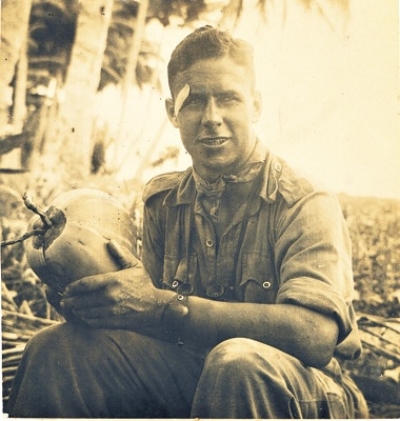STAN BISSET MC OAM MID
I have had the pleasure of meeting Stan Bisset on several occasions. The first time I met him I wanted to have my picture taken with this true Australian Legend, unfortunately my good friend and fellow historian who was holding the camera and took the shot had in fact pressed the off switch thus turning the camera off this came as such a disappointment.
Here I was talking to for the first time to one of my heroes and I had blown the chance of getting a photo with him. As you can imagine Stan was quite busy I went back over to him and explained what had happened and asked if we could try again, Stan just laughed and put is arm around me and said no problems lets go again. Stan is a very humble and kind he did not wear his medals only his 2/14th Battalion Association tie and his RSL badge.
Instead of writing a story of his life which one can find in the many histories that have been written about the Kokoda Campaign, I will let the words of the man himself tell the story.
"I'm the oldest living Wallaby, I was selected to go to England with the Australian Rugby Union team in September 1939. We met the King and Queen, but we never played in England because we arrived there the day before World War Two was declared. The tour was called off. We played one game - against the British army in Bombay, India - on the way back to Australia. We won comfortably.
Back home, I joined the 2/14th Battalion. My older brother, Hal, had already joined. He was known throughout the battalion as Butch. We were both pretty good marksmen. We grew up mostly in Melbourne, but we spent a couple of years at Warrandyte in the Victorian countryside. We had some wonderful times there. We used to build rafts and raft down the Yarra River for miles and miles. We had .22 rifles and we learned to shoot a flame out at 25 meters. We could also shoot rabbits on the run. We went with the battalion to the Middle East and fought in Syria, but after Pearl Harbour was bombed we were all pretty keen to get back home to defend Australia against the Japanese.
We were sent up the Kokoda Track to relieve the 39th Battalion, who had been fighting the Japanese for weeks and were holding out against the enemy at Isurava.
By this time I was an intelligence officer, a lieutenant, in charge of a section of 12 men. Butch, also a lieutenant, was a platoon commander. We'd had some stiff climbs in some of the rugged mountains in Syria, but this was much worse; the weather and the thick mud was appalling. The men perspired so much they were completely dehydrated by the end of the day and had to be issued with salt tablets on a daily basis.
By the time we got to the village of Efogi we felt we had conquered the worst of the terrain. We got our second wind. We were still a fair way from the enemy and our fellows were much happier and morale was at a high level. When we got to the dry lakes of Myola near the top of the range, we found to our dismay that none of the supplies we had anticipated had been dropped by the transport planes.
We'd been expecting about 20 or 30 days' supply of rations and ammunition. We'd practically used up all our rations we had carried up the track so our brigade commander, Brigadier Arnold Potts, sent an urgent message to Port Moresby for more supplies. We reached Isurava by August 27 and gradually started taking over the exhausted 39th Battalion's positions. The next day the main battle with the Japanese started. They started attacking in fierce human waves. We were vastly outnumbered. We had been expecting about 1500 Japanese, but by the time we got to Isurava their strength had grown to about 8000 and they were coming at us wave after wave. All we had were the 546 men of the 2/14th and remnants of the 39th Battalion.
Butch and his platoon were sent up to the higher ground, to a position the Japanese aiming to capture so they could overlook the battlefield. In two days Butch's platoon of about 35 men was confronted by 11 Japanese attacks. In each attack there were over 100 Japanese.
We lost a lot of casualties and Butch got a burst from a Japanese machinegun through his tummy when he was going around distributing grenades. He was badly wounded, but I didn't learn about it until several hours as I was busy doing my rounds as intelligence officer. I got within 30m of Butch's platoon and I came across one of his Bren gunners who had lost his hand when a grenade he was throwing went off prematurely, so I whizzed him back to the medical aid post.
Later, I heard Butch had been hit and stretcher-bearers were bringing him back. So I went up the track and caught up with them. We laid Butch down about 15m off the side of the track. Our medical officer, Don Duffy, had a look at Buth and could see there was no hope for him. By then it was about 10 o'clock at night. The doc gave him some morphine and I said. ‘I'll stay with him, doc.'
I sat with him for six hours. He was quite conscious at times. We talked about Mum and Dad, our good times and bad times, what we did as kids. I sat with him until about 4am, when he finally left us. We buried him beside the tack."
Stan passed away on the 5 October 2010 on the Sunshine Coast, he was 98 years of age.
Compiled by Dave Howell

Stan Bisset
